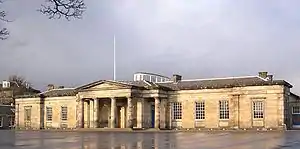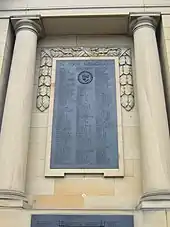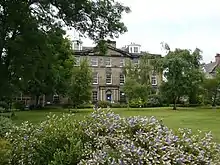Edinburgh Academy
The Edinburgh Academy is a private day school in Edinburgh, Scotland, which was opened in 1824. The original building, on Henderson Row in the city's New Town, is now part of the Senior School. The Junior School is located on Arboretum Road to the north of the city's Royal Botanic Garden.
| The Edinburgh Academy | |
|---|---|
 | |
| Address | |
Henderson Row , EH3 5BL Scotland | |
| Information | |
| Type | Public school Private school |
| Motto | Αἰὲν ἀριστεύειν (Greek) (Always Excel) |
| Established | 1824 |
| Founders | Henry Cockburn, Leonard Horner and John Russell |
| Local authority | City of Edinburgh |
| Rector | Barry Welsh[1] |
| Gender | Mixed |
| Age | 2 to 18 |
| Enrolment | 93 (Nursery) 372 (Junior School) 552 (Senior School) |
| Houses | Carmichael Cockburn Houses (Dundas) Kinross |
| Colour(s) | Blue and White |
| HMIE Reports | Report |
| School Song | Floreat Academia (May the Academy flourish) |
| Former Pupils | Edinburgh Academicals / Accies |
| Website | www |
The Edinburgh Academy was originally a day and boarding school for boys. It ceased boarding and transitioned to co-education in 2008 and is now a fully coeducational day school.[2] The nursery, housed in a 2008 purpose built block on the Junior campus, caters for children from age 2 to 5. The Junior School admits children from age 6 to 10 whilst the Senior School takes pupils from age 10 to 18.
In 2023 the school was investigated by the Scottish Child Abuse Inquiry over numerous allegations by ex-pupils of historical abuse by several staff. The Academy later issued an acknowledgement and apology.
Foundation
In 1822, the school's founders, Henry Cockburn and Leonard Horner, agreed that Edinburgh required a new school to promote classical learning. Edinburgh's Royal High School provided a classical education, but the founders felt that greater provision was needed for the teaching of Greek, to compete with some of England's public schools. Cockburn and Horner recruited John Russell as a co-founder and the three of them, together with other interested parties, put a proposal to the City Council for the building of a new school. The City Fathers gave their approval in 1823 and fifteen Directors were elected, comprising the three founders along with Sir Walter Scott, Sir John Hay, Robert Dundas and nine others.
Buildings


The main building of the Senior School, with its Greek Doric frontage, was designed by architect William Burn.[3] The stone used was principally from the nearby Craigleith Quarry. The Foundation Stone was laid in June 1823 and the school opened for the first session in October 1824. In 1892, new classrooms were built along the western wall of the site, and in 1900, the School Library was opened, followed by the new Science Block in 1909, both along the eastern wall. At the back of the school the Dining Hall, and the Rifle Range beneath it, was opened in 1912 and after World War I, the Gymnasium was built. This was dedicated as a War Memorial to Edinburgh Academicals (former pupils) who had fallen during the hostilities of 1914 to 1918.[4] The memorial was by Pilkington Jackson. A later plaque commemorates ex-pupils who fell in the Second World War.
In 1945, a new building, Denham Green House, was acquired in the Trinity area of Edinburgh. This was used for the junior department (now known as Early Years) of the Preparatory School (now known as The Edinburgh Academy Junior School). In 1960, a new building for the upper three years of the Preparatory School was completed in Inverleith (Arboretum campus). Denham Green's nursery and early years facilities were relocated to purpose built accommodation on the Preparatory school's Arboretum campus in 1987. In 1992, the Rector's residence, Academy House and in 1997, a new Games Hall were constructed on the same campus. The latter was partly funded by money from The Lottery and Sports Council and is for the use not only of pupils in both parts of the school but also of the community in the area. A new computing and music building was completed at the Junior School in 2005 and a new nursery and after school facility in 2008.
At Henderson Row, the property next to the school, No 32, was acquired for administrative use in 1972 and in 1977, the Academy acquired the junior school of Donaldson's College, to the west. This allowed departments to expand and a purpose-built Music School was opened on this part of the campus in 1991. In 2005 the 1909 science block was demolished and a new science block, the James Clerk Maxwell Centre, named in honour of the 19th century scientist and former pupil, was opened on 3 November 2006 by Lord Falconer of Thoroton.[5]
Abuse
In 2020 and 2021, six men accused a man who had taught at Fettes College and Edinburgh Academy of physical and sexual abuse at the schools when they were pupils in the 1970s.[6] The Scottish Crown Prosecution Service was initially reluctant to prosecute the alleged abuser because of difficulties in seeking his extradition from South Africa—he had moved there—and his advanced age,[7] but South Africa approved the UK's extradition request, on six charges of lewd, indecent and libidinous practices and behaviour and one of indecent assault,[8] in 2020. Edinburgh Academy apologised to anyone who suffered abuse and said in 2022 that it now had robust safeguarding measures in place. The perpetrator admitted the abuse, and was fighting extradition from South Africa to the UK in 2022.[8]
On 27 July 2022, broadcaster Nicky Campbell disclosed that he had witnessed and experienced sexual and violent physical abuse while a pupil at the Edinburgh Academy in the 1970s.[9][10][11] Alex Renton, a journalist investigating child abuse in private schools, reported that ex-pupils of Edinburgh Academy had named 17 other staff members, employed between the 1950s and 1980s, as physical and sexual abusers.[12]
On 8 August 2023, the Scottish Child Abuse Inquiry (SCAI) continued its Hearings in Edinburgh, before Anne Smith, Lady Smith, focusing for 14 days on the Edinburgh Academy and taking evidence from former pupils and members of staff as well as medical experts.[13]
Many pupils who identified themselves as survivors of abuse, whether as boarders or day boys, testified in person. Many more had their testimony read out. The SCAI Evidence Hub is frequently updated.[14] The evidence made clear that witnessing, and sometimes being made to participate in, abuse was as traumatic as being abused. Survivors said "We were made feral". When actor Iain Glen spoke out about his abuse in 2002, "the wrath of [wealthy Edinburgh suburbs] Morningside and Muirfield and Murrayfield rained down on his head with biblical fury because he'd broken the code, the Edinburgh omertà".[15]
Several testimonies mentioned many of the same names, redacted from the Evidence Hub. At least two of these names were under police investigation at the time of the Hearings. These names were, however, allowed to be used in extensive national and international media coverage of the ongoing proceedings.[16][17][18]
The school's valedictory appreciations for these former members of staff in September 1973 and January 1995 were contradicted in the testimony against them.[19][20]
Also frequently mentioned was Hamish Dawson, deceased, whose affectionate appreciation from the Rector in September 1984 was contradicted by testimony from many alleging to have suffered at his hands.[21]
The Hearings regarding the Edinburgh Academy concluded on 30 August. On that day, the school issued a lengthy statement of acknowledgment and apology for both the "brutal and unrestrained" historical abuse and its consequences for "grown men deeply damaged as children".[22] The school did not give details regarding plans for acknowledgement of the historical abuse at the school's bicentennial events in 2024.
Notable alumni
Former pupils of The Edinburgh Academy are known as Academicals, or Accies, a name shared with the associated rugby club.
Famous alumni of the school include Robert Louis Stevenson, James Clerk Maxwell, Nicky Campbell, Magnus Magnusson, Baron Falconer of Thoroton, Mike Blair, and Iain Glen. It has also produced one Nobel Prize winner (J. Michael Kosterlitz), numerous political and legal figures, several rugby internationals and nine recipients of the Victoria Cross; the highest number of any school in Scotland. According to the Sutton Trust, the school is placed second in Scotland and joint 36th in the UK for the number of the nation's leading people produced.[23]
Rectors
Rectors of The Edinburgh Academy since it was founded in 1824:[4]
- 1824–1828: John Williams
- 1828–1829: Thomas Sheepshanks
- 1829–1847: John Williams, again
- 1847–1854: John Hannah
- 1854–1869: James Stephen Hodson
- 1869–1888: Thomas Harvey
- 1888–1901: Robert Mackenzie
- 1901–1910: Reginald Carter
- 1910–1926: Robert Ferard
- 1926–1931: Hugh Lyon
- 1931–1945: Lionel Smith[24]
- 1945–1951: Clarence Seaman[24]
- 1951–1962: Robert Watt
- 1962–1977: Herbert Mills
- 1977–1992: Laurence Ellis
- 1992–1995: John Rees
- 1995–2008: John Light
- 2008–2017: Marco Longmore
- 2017–present: Barry Welsh[25]
Other notable staff
- D'Arcy Wentworth Thompson, classicist, taught at the school from 1852 to 1863, father of biologist also named D'Arcy Wentworth Thompson
- Jack Mendl, taught at the school from 1950 to 1977, also played cricket at first-class level
- Arthur Pressland FRSE (1865–1934), educational theorist, linguist, schoolmaster and writer
- W. P. D. Wightman FRSE Science Master from 1923 to 1951
- Ian Wares[15]
- Hamish Dawson[15]
References
- "Rector's Welcome". Archived from the original on 20 December 2016. Retrieved 5 December 2016.
- "Edinburgh Academy to stop taking boarders in £5m revamp". Herald Scotland. 29 March 2007.
- Cosh, Mary (2003). Edinburgh:The Golden Age. John Donald. p. 659. ISBN 978-1-78027-258-0.
- "History of the School". Edinburgh Academy. 2007. Archived from the original on 9 November 2007.
- "opening of James Clerk Maxwell Centre". Edinburgh Academy. Archived from the original on 30 September 2007. Retrieved 20 November 2006.
- Macaskill, Mark (9 May 2021). "More men accuse ex-Fettes teacher of historical abuse". The Sunday Times. London.
- McKenzie, Jamie (1 May 2021). "Crown decision not to extradite alleged Fettes abuser branded 'weak' by politicians as South African lawyers question it". Edinburgh Evening News.
- Cook, James; Schoonbee, Karen (6 August 2022). "Nicky Campbell teacher admits schoolboy abuse in court documents". BBC News.
- "Nicky Campbell: School abuse still haunts me". BBC News. 27 July 2022. Retrieved 27 July 2022.
- Different with Nicky Campbell: Edgar. BBC Sounds (Audio, 55'). 27 July 2022.
- Brocklehurst, Steven (22 February 2023). "'I can't bear his blood in me' - sex abuser's daughter". BBC News Scotland.
- "Boys 'abused by 17 staff at elite school' attended by Nicky Campbell". 4 August 2022. Retrieved 29 August 2022.
- "Abuse survivors condemn Edinburgh Academy ahead of inquiry". BBC. 8 August 2023. Retrieved 27 August 2023.
- "SCAI Evidence Hub". Scottish Child Abuse Inquiry. Retrieved 27 August 2023.
- Brooks, Libby (30 August 2023). "'The injustice hurts you more': survivors tell of abuse at Edinburgh academy". The Guardian.
- Horne, Marc (16 August 2023). "Boy, 6, 'abused with hose for wetting bed at Edinburgh Academy'". The Times.
- Mega, Marcello (21 August 2023). "Scots school abuse survivor praises Nicky Campbell for bringing together 'band of brothers'". Daily Record. Retrieved 27 August 2023.
- Brooks, Libby (22 August 2023). "Nicky Campbell 'haunted' by abuse at Edinburgh Academy, inquiry hears". Guardian. Retrieved 27 August 2023.
- "Chronicle Vol.LXXX No.3 p.283". Edinburgh Academy Digital Archive. Retrieved 27 August 2023.
- "Chronicle Vol.CII No.3 p.52". Edinburgh Academy Digital Archive. Retrieved 27 August 2023.
- "Chronicle Vol.XCI No.3 p.131". Edinburgh Academy Digital Archive. Retrieved 27 August 2023.
- "Edinburgh Academy apologises for 'brutal' historical abuse". BBC. Retrieved 31 August 2023.
- "The Educational Backgrounds of the Nation's Leading People" (PDF). Sutton Trust. November 2012. Archived (PDF) from the original on 12 August 2016.
- Dalyell, Tam (14 June 2015). "William Prosser: Lawyer and administrator who bestrode both the legal world and the artistic scene of his native Edinburgh". Independent. Retrieved 28 October 2018.
- "Meet our Leadership Team". The Edinburgh Academy. Retrieved 6 August 2022.
- Magnus Magnusson (1974), The Clacken and the Slate, Collins, London. ISBN 0-00-411170-2
- Edinburgh Academical Club (1995), List of Past and Present Pupils 1824-1995, Edinburgh Academical Club
- Stirling, Bill (1999), 175 Accies, Edinburgh Academical Club
External links
 Media related to Edinburgh Academy at Wikimedia Commons
Media related to Edinburgh Academy at Wikimedia Commons- The School website
- Edinburgh Academy's page on Scottish Schools Online